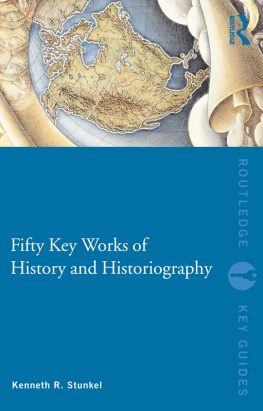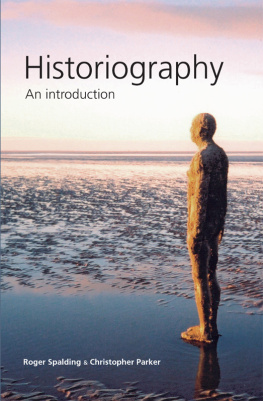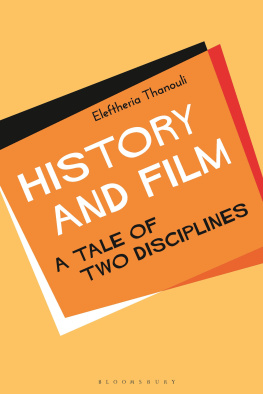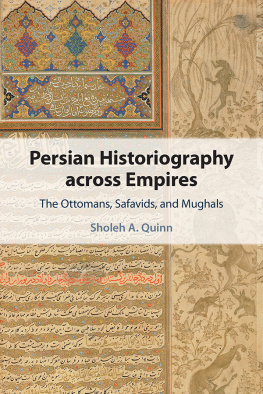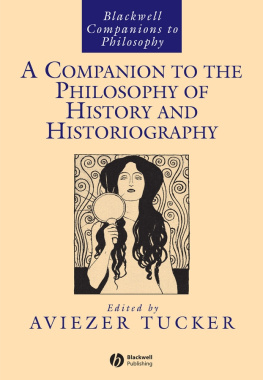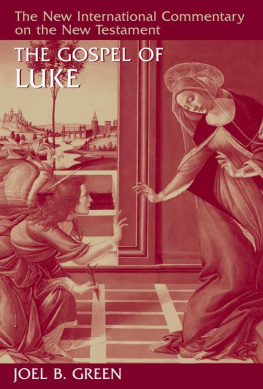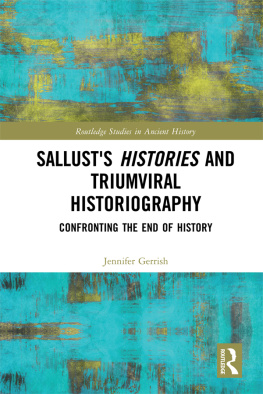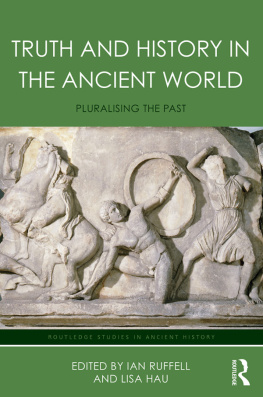Stunkel - Fifty key works of history and historiography
Here you can read online Stunkel - Fifty key works of history and historiography full text of the book (entire story) in english for free. Download pdf and epub, get meaning, cover and reviews about this ebook. City: London, New York, year: 2011, publisher: Routledge, genre: Art. Description of the work, (preface) as well as reviews are available. Best literature library LitArk.com created for fans of good reading and offers a wide selection of genres:
Romance novel
Science fiction
Adventure
Detective
Science
History
Home and family
Prose
Art
Politics
Computer
Non-fiction
Religion
Business
Children
Humor
Choose a favorite category and find really read worthwhile books. Enjoy immersion in the world of imagination, feel the emotions of the characters or learn something new for yourself, make an fascinating discovery.
Fifty key works of history and historiography: summary, description and annotation
We offer to read an annotation, description, summary or preface (depends on what the author of the book "Fifty key works of history and historiography" wrote himself). If you haven't found the necessary information about the book — write in the comments, we will try to find it.
Stunkel: author's other books
Who wrote Fifty key works of history and historiography? Find out the surname, the name of the author of the book and a list of all author's works by series.
Fifty key works of history and historiography — read online for free the complete book (whole text) full work
Below is the text of the book, divided by pages. System saving the place of the last page read, allows you to conveniently read the book "Fifty key works of history and historiography" online for free, without having to search again every time where you left off. Put a bookmark, and you can go to the page where you finished reading at any time.
Font size:
Interval:
Bookmark:
FIFTY KEY WORKS OF HISTORY AND HISTORIOGRAPHY
Fifty Key Works of History and Historiography introduces some of the most important works ever written by those who have sought to understand, capture, query and interpret the past. The works covered include texts from ancient times to the present day and from different cultural traditions ensuring a wide variety of schools, methods and ideas are introduced. Each of the fifty texts represents at least one of six broad categories:
Early examples of historiography (e.g. Herodotus and Augustine)
Non-western works (e.g. Shaddad and Fukuzawa)
Critical historiography (e.g. Mabillon and Ranke)
History of minorities, neglected groups or subjects (e.g. Said and Needham)
Broad sweeps of history (e.g. Mumford and Hofstadter)
Problematic or unconventional historiography (e.g. Foucault and White)
Each of the key works is introduced in a short essay written in a lively and engaging style which provides the ideal preparation for reading the text itself. Complete with a substantial introduction to the field, this book is the perfect starting point for anyone new to the study of history or historiography.
Kenneth R. Stunkel is Professor of History at Monmouth University, New Jersey, USA. His Ph.D in history is from the University of Maryland. Teaching and publication include classical civilization, South Asia (India), East Asia (China, and Japan), and European intellectual and cultural history. His recent books are Ideas and Art in Asian Civilizations: India, China, and Japan (2011), and Understanding Lewis Mumford: A Guide for the Perplexed (2004).
ALSO AVAILABLE FROM ROUTLEDGE
World History: The Basics
Peter N. Stearns
978-0-415-58275-9
Fifty Key Thinkers on History (Second Edition)
Edited by Marnie Hughes-Warrington
978-0-415-36651-9
The Modern Historiography Reader
Edited by Adam Budd
978-0-415-45887-0
Modern Historiography: An Introduction
Michael Bentley
978-0-415-20267-1
Companion to Historiography
Edited by Michael Bentley
978-0-415-28557-5
FIFTY KEY WORKS OF HISTORY AND HISTORIOGRAPHY
Kenneth R. Stunkel

First published 2011
by Routledge
2 Park Square, Milton Park, Abingdon, Oxon, OX14 4RN
Simultaneously published in the USA and Canada
by Routledge
270 Madison Avenue, New York, NY 10016
Routledge is an imprint of the Taylor & Francis Group, an informa business
2011 Kenneth R. Stunkel
The right of Kenneth R. Stunkel to be identified as author of this work has been asserted by him in accordance with sections 77 and 78 of the Copyright, Designs and Patents Act 1988.
All rights reserved. No part of this book may be reprinted or reproduced or utilised in any form or by any electronic, mechanical, or other means, now known or hereafter invented, including photocopying and recording, or in any information storage or retrieval system, without permission in writing from the publishers.
Trademark notice: Product or corporate names may be trademarks or registered trademarks, and are used only for identification and explanation without intent to infringe.
British Library Cataloguing in Publication Data
A catalogue record for this book is available from the British Library
Library of Congress Cataloging in Publication Data
Stunkel, Kenneth R.
Fifty key works of history and historiography / by Kenneth R. Stunkel.
p. cm.
1. Historiography. 2. HistoryBibliography. 3. Historiography Bibliography. I. Title.
D13.2.S88 2011
016.909dc22
2010046798
ISBN 13: 978-0-415-57331-3 (hbk)
ISBN 13: 978-0-415-57332-0 (pbk)
ISBN 13: 978-0-203-81665-3 (ebk)
CONTENTS
Introduction to Fifty Key Works of History and Historiography
Most societies have preferred, with more or less success, to avoid being swallowed by Lethe, the river of forgetfulness. For the human animal, it seems anything is preferable to complete amnesia, which accounts for early devices on behalf of remembrance like myth, legend, and oral tradition. Better a myth than nothing at all. Greek myths are not merely convenient vehicles to explain natural events; they also provide markers into the past, accessible stories about how things came to be what they are. While useful for understanding literature, art, and religion, however, such devices do not qualify as history.
For our purposes, history refers to human thought and activity in past time, their settings and consequences, and what can be known about them from surviving traces. Historiography refers to distinct bodies of historical inquiry and writing, for example, Greek. Medieval, Chinese, Islamic, and how such works have been researched, written, used, and passed on in different times and places. Any discussion of historical works and their authors cannot avoid how and why the work was done, justified, and disseminated. These fifty essays afford a glimpse of how the past has been queried, recovered, interpreted, understood, and explained from ancient times to the present. The emphasis is on works, what they say, and on what principles they were written, with supporting remarks as needed about careers and views of their authors.
This slender volume on such a big subject rests on three assumptions. The first is that historical knowledge has been achieved in a plurality of cultural settings. These include the West since the ancient world as well as several non-Western societies. The second is that whatever knowledge there is has authority because credible sources Innumerable past events, persons, objects, and settings have left traces inviting some form of historical study, which has been done from many theoretical and methodological perspectives. Varieties of historical inquiry have been increasing without a sign of leveling off.
FiftyKeyWorksWhat and Why
The practice of history has its own history (another meaning of historiography) with many players and points of view. Any attempt to cover that ground is a huge undertaking. Such an overview is not the task of this volume, which must not be confused with histories of historiography. A second caution is about audiences, which for this volume are students, undergraduate and graduate, and possibly a slice of the general public endowed with curiosity, but not specialists or professionals in search of heavily footnoted scholarship, this introduction being an exception.
Since it is improbable that ten historians from various fields would agree on the key status of many works in a list of 50, why attempt the enterprise at all? A foremost reason is to explain and illustrate in one slim volume some variations of method, purpose, and style in major traditions of historiography. Clear perspectives are needed, however daunting the task, in an ocean of subject matter and a rainforest of historians and their works. A second reason is to survey in 50 works how objectivity and truth in history have been pursued, defended, and neglected from the ancient world to the present in several cultural traditions, which is a principal aim of this volume.
Because of so much historical literature within a diversity of interests, the scope of this book is limited by necessity. One limitation is the essays, for each must stay within range of 2000 words to keep the length of the book manageable and economical.available in accessible editions. The search, on balance, worked out, but influenced the choice of works.
The 50 works selected are described as key because they represent and illustrate, more or less, a rationale of six themes. Justification for each lies in plausible connections with the themes. They are: (1) early examples of method and style in historiography (e.g., Herodotus, Sallust, Augustine, Anglo-Saxon Chronicles); (2) select non-Western works for contrast with Western works (e.g., Shaddad, Fukuzawa, Pannikar, Chien Mu); (3) issues of evidence, and the emergence and practice of critical historiography, by which is meant a self-conscious search for believable evidence needed to support generalizations about the past, and the exploitation of new kinds of evidence (e.g., Mabillon, Ranke, Mommsen, Thomas); (4) the expansion of historical subject matter, or genres of historywomen, minorities, science, technology, ideas, broad interpretations (e.g., Pirenne, Lerner, Needham, Said); (5) works that take on generous chunks of the past (e.g., Lovejoy, Aris, Mumford, Hofstadter); (6) problematic historiography, or eccentric works that rest uneasily in the familiar domain of history (e.g., Procopius, Herder, Foucault, White). Themes overlap in a number of works.
Next pageFont size:
Interval:
Bookmark:
Similar books «Fifty key works of history and historiography»
Look at similar books to Fifty key works of history and historiography. We have selected literature similar in name and meaning in the hope of providing readers with more options to find new, interesting, not yet read works.
Discussion, reviews of the book Fifty key works of history and historiography and just readers' own opinions. Leave your comments, write what you think about the work, its meaning or the main characters. Specify what exactly you liked and what you didn't like, and why you think so.

